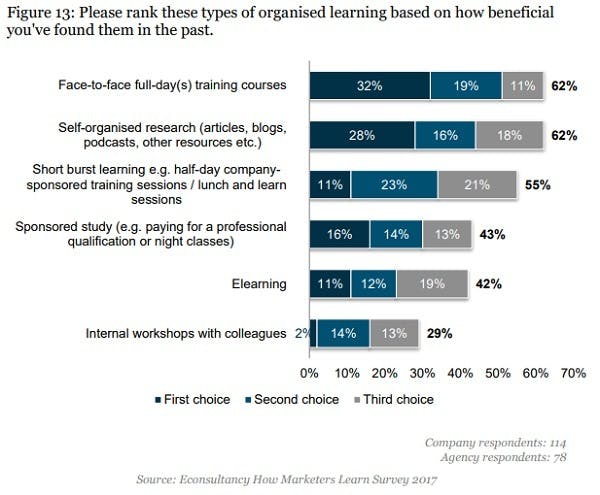But why is training important for marketers and how can they build a business case for investment?
How do marketers learn?
Marketers have access to untold resources online and you may expect self-learning to be the most popular type of learning activity.
However, when Econsultancy asked marketers what type of learning they found most beneficial, ‘Face-to-face full-day(s) training courses’ was selected most often as first choice (32%) ahead of ‘self-organised research’ (28%).

This chart demonstrates a desire amongst marketers for face-to-face training to not just supplement the learning that they do on their own, but as a first port of call for marketing insight and advice. Consider this from Sean Donnelly, Senior Research Analyst at Econsultancy and author of the How Marketers Learn report:
One hypothesis for the preference for face-to-face training may be the sheer clarity and focus of organised learning in a space away from the day-to-day workplace. The time to think of new ideas is itself as valuable as the training content. This kind of training may also offer the opportunity to get the perspective of other marketers from other teams or even other organisations.
What’s more, it may also be the prospective next steps that follow formal training which makes it so valuable to marketers.
How often do marketers learn?
As Richard Robinson writes in Marketing Week, citing figures from Econsultancy’s How Marketers Learn report “Almost 60% of marketers claim to spend just two days or less on any form of professional development per month, 56% say that their organisations have little in the way of a formal strategy towards learning, and just 14% claim their marketing training is led by someone in marketing.”
So why should employers invest in professional development?
I reached out to a few different training professionals for their thoughts on why it pays to keep marketers learning.
1. Culture
Sean Donnelly speaks to the true benefits of training as a means of instilling values and culture in employees.
“Access to regular training is a great way to encourage greater staff engagement rather than simply compliance with existing procedures. After all, modern marketing departments are changing all of the time. They require people with the right skills, attitude and willingness to proactively engage in improving marketing activities as opposed to continuing with the status quo. Continuing on the subject of instilling the right corporate culture, I think that staff should be given learning goals as well as performance objectives.”
This cultural shift should start from the top of the business and funnel down, argues Richard Robinson.
“Marketing leaders are the new game changers, so they need to step up to the plate. To keep marketers one step ahead… a new approach is needed to marketing capability. Every marketing leader needs to… take back personal responsibility for upskilling their marketers, be brave, and believe in something bigger.”
Sean Donnelly adds that training is just as valuable for both overstretched and demotivated employees.
“If the work that people have to do goes beyond their capabilities, this can result in anxiety. At the other end of the spectrum, if people are doing work that becomes too easy, they will get bored. Both scenarios are not good for staff morale or company culture. Training along with opportunities to do more challenging work can fill this gap.”

2. Marketing has changed
Neil Perkin, Founder at Only Dead Fish highlights the fast pace of change in marketing as one of the most important reasons for upskilling your team.
“The world is changing faster than ever before and teams in every organisation are finding that they are operating in rapidly evolving, increasingly uncertain environments so the need for expertise and continuous learning has never been greater. Investing in the development of your people is a direct investment in the future of your business…”
This point is echoed by Richard Robinson who emphasises the importance of training to help engrain a customer-centric mindset into marketers.
“Often CMOs ignore the pivotal role they need to play and allow leadership of modern-day marketing capability to be usurped by sibling departments. In the process they unintentionally hold back their teams from understanding and adding real value to the needs of their customers.”
Sean Donnelly, adds that because… “marketing technology is constantly creating and responding to change, people and organisations need to follow suit. With this in mind, the work environment needs to also become a learning environment and therefore be adaptable to change…”
3. The risk of not…
Sean Donnelly again:
“…organisations with no [training] strategy may well have decided that they are happy not to invest in their people in the knowledge that they may experience higher staff turnover. This presents a big risk: marketers are at the forefront of digital initiatives, which are launched to help businesses adapt to volatile environments and the changing expectations of their customers.
“Modern marketers need to be equipped with the knowledge and skills to lead these important strategic projects… only 27% of respondents to our research indicated that their organisation has a well-considered strategy for learning and development, endorsed at the highest level.”
4. Training kickstarts learning
“I’m a firm believer in the business case for training but I think the bigger business case is for ‘learning’,” says Sean Donnelly.
“That means it is the marketer that needs to have agency over their learning as opposed to a trainer or even a manager. The follow on from that is that not all training needs to take place in the classroom, at least not in the classroom as we know it.
“Enlightened organisations could consider creating peer to peer and mentor relationships which would give up-and-coming marketers a greater opportunity to engage and even question more senior colleagues. After all, modern marketing organisations don’t only need people who can follow instructions. They need people who can identify trends, who can identify ways that things can be done better and can take agency over figuring out how to do those things.”
Subscribers can download Econsultancy’s How Marketers Learn report. Econsultancy also offers a variety of training courses, both face-to-face and online.

Comments